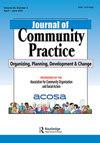Youth civic and community engagement under Singapore’s COVID-19 lockdown: motivations, online mobilization, action, and future directions
IF 1.2
Q2 SOCIAL WORK
引用次数: 5
Abstract
ABSTRACT Disasters like COVID-19 adversely affect young adults but also present opportunities for civic and community engagement. Cognizant of and personally experiencing the pandemic’s disproportionate socio-economic fallout on disadvantaged communities, civically engaged young adults have mobilized and questioned government actors and structures which perpetuated pre-pandemic vulnerabilities. However, research gaps exist about their motivations, community engagement processes, and implications of post-disaster mobilization on long-term socio-political engagement with communities and governments. A thematic analysis of public podcast episodes produced by the author during Singapore’s COVID-19 lockdown revealed five chronologically related themes: “Pandemic and lockdown as triggers,” “Motivations,” “Online mobilization,” “Action,” and “Future directions.” Respondents, triggered by COVID-19, were motivated by new socio-economic needs and existing inequalities and responded quickly. Their seamless online mobilization and action informed future civic and political directions, resulting in two distinct approaches to long-term engagement. Those framing their initiatives as addressing preexisting needs called for more fundamental changes to ensure communities were not vulnerable to start with. Others who believed that the government’s pandemic response was adequate focused solely on their own initiatives, which they saw as filling gaps that the government could not. Youth COVID-19 engagement is thus likely to shape community-building and young adults’ expectations of governments.新加坡新冠肺炎封锁下的青年公民和社区参与:动机、在线动员、行动和未来方向
像COVID-19这样的灾害对年轻人产生了不利影响,但也为公民和社区参与提供了机会。认识到并亲身经历了这一大流行病对弱势社区造成的不成比例的社会经济影响,参与公民活动的青年成年人动员起来,对使大流行病前脆弱性长期存在的政府行为体和结构提出了质疑。然而,在他们的动机、社区参与过程以及灾后动员对社区和政府长期社会政治参与的影响方面,研究存在差距。作者对新加坡新冠肺炎封锁期间制作的公共播客节目进行了专题分析,揭示了五个按时间顺序相关的主题:“流行病和封锁作为触发因素”、“动机”、“在线动员”、“行动”和“未来方向”。受2019冠状病毒病影响,受访者受到新的社会经济需求和现有不平等现象的推动,并迅速作出反应。他们无缝的在线动员和行动为未来的公民和政治方向提供了信息,从而形成了两种不同的长期参与方式。那些将他们的倡议定义为解决先前存在的需求的人呼吁进行更根本的变革,以确保社区从一开始就不容易受到伤害。还有一些人认为政府的疫情应对措施已经足够,他们只关注自己的举措,认为这些举措填补了政府无法填补的空白。因此,青年参与COVID-19可能会影响社区建设和年轻人对政府的期望。
本文章由计算机程序翻译,如有差异,请以英文原文为准。
求助全文
约1分钟内获得全文
求助全文
来源期刊

Journal of Community Practice
SOCIAL WORK-
CiteScore
2.40
自引率
18.20%
发文量
27
期刊介绍:
The Journal of Community Practice is an interdisciplinary journal grounded in social work. It is designed to provide a forum for community practice, including community organizing, planning, social administration, organizational development, community development, and social change. The journal contributes to the advancement of knowledge related to numerous disciplines, including social work and the social sciences, urban planning, social and economic development, community organizing, policy analysis, urban and rural sociology, community health, public administration, and nonprofit management. As a forum for authors and a resource for readers, this journal makes an invaluable contribution to the community"s conceptualization, applications, and practice.
 求助内容:
求助内容: 应助结果提醒方式:
应助结果提醒方式:


